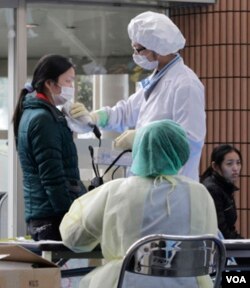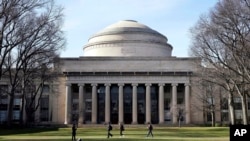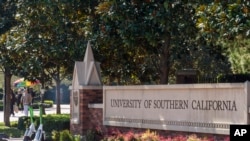Student Union
'I really just want them to run away': Kana's Story Part 2
Earlier today we shared an email from Japanese student Kana Igarashi, who attends Santa Monica College in California. She told us about her mother, who is in Fukushima Prefecture, one of the areas hit hard by the earthquake and tsunami, and the site of the nuclear plants that are in danger. Kana's father, grandparents and sisters are also there.
Kana says her family lives about 80km from the nuclear plants. Currently those within 30km have been told to evacuate or stay inside, but the U.S. embassy has advised Americans to stay at least 80km from the plants.
I spoke to her on the phone this morning to find out more.
On how she heard about the earthquake. I only know me from Fukushima, and my friends know that I’m the only one from Fukushima in this college. Many of my friends called me to call to Japan because they found out that the earthquake hit my area – my prefecture and then the next prefecture, Miyagi Prefecture.
On the first 24 hours and hearing news from her family. I actually was really really worried about it – worried about them. I couldn’t go to sleep. I was just watching the NHK news on the internet. And then I really got scared because my prefecture is really in countryside and I didn’t really expect that many cities I know and then my city is on TV. And then seeing those disasters on TV all the time and then I wasn’t able to talk to my family.
In the daytime everyone tried to call to their family in the north and then the connection is really packed. But still there is some way to contact with them. So what my parents did was woke up like 2 in the morning to call me.”
On her family staying in Fukushima. I talked to my mom yesterday too, actually, last night. She also told me how many victims are trying to save other victims and then people in Fukushima are trying to stay in Fukushima to help those people who are in worse areas. And my parents are even donating stuff like blankets and stuff because it’s really really cold over there.
So I really really am proud of my family, but at the same time I really just want them to run away from prefecture because it’s already the nuclear radiation.
On what happens next. I was hoping that I can go back to Japan after graduation, which is around July this year. But the thing is, my mom also said I should be here, probably. ‘You should change your plan,’ that’s what my mom said.
It’s really sad to think about, but my family are thinking that Fukushima the city might not be able to be the place to live anymore for probably 10 more years since the radiation is all around. And the water probably people cannot grow anything. People cannot survive in Fukushima. My mom thought that it might be a good idea that I am here, then they might be able to come here. They might have to come here to be with me if that’s possible.
On watching the news. It’s actually too difficult to watch. I don’t want to really feel depressed all day. I know what my parents would want me to do is go to school normally and study so that I can be successful in the future and I can support them probably.
So I know that many other Japanese students are not coming to school and are crying and watching TV all day, but I am more like those people who are trying to move on and I try to be positive. I don’t want to watch those TVs which show still earthquakes are hitting Japan and radiation exploded again.
On the support of her classmates. People are starting to donate money to Japan and Red Cross are trying to collect money for Japan. My college also are supporting Japanese students right now. They also emailed me, ‘how’s everything.’
I feel like I’m not alone and I feel like I’m really happy that I was Japanese. People are helping Japanese people right now.
We closed the phone call by saying that we'll talk again once her family is out of danger, and we can have a happy conversation. I hope that time will come very soon.
See all News Updates of the Day
US remains top choice for Indian students going abroad
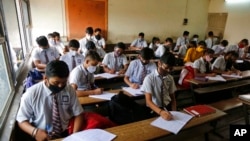
About 69% of Indian students traveling abroad for their studies chose the United States, according to a Oxford International’s Student Global Mobility Index. Other popular choices were the United Kingdom, Canada and Australia.
Education Times reports the main influencers for deciding where to study abroad – for Indian students and others – were parents. (April 2024)
Malaysian official: Schools can’t turn away from global tensions

Zambry Abdul Kadir, Malaysia’s higher education minister, said protests spreading across universities in the United States show that schools can’t ignore political tensions.
Helen Packer, reporting in Times Higher Education, said the minister reminded educators that universities are key in the development of leaders, individuals and societies. (April 2024)
Social media breaks are difficult, but necessary

Between online classes, maintaining social connections and working on projects, college students can have a hard time disengaging from the demands of technology.
In Florida International University’s PantherNOW, Ariana Rodriguez offers strategies for taking a break from social media. (April 2024)
- By Melos Ambaye
Many master's degrees aren't worth the investment, research shows
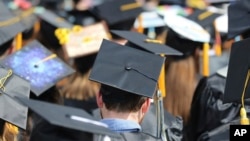
Nearly half of master's degrees have a negative financial return, according to new research by the Foundation for Research on Equal Opportunity, an economic research organization.
The study indicates that many graduate degree programs do not increase lifetime earnings enough to be worth it.
While 23% of bachelor’s degree programs yield a negative financial return on investment, 43% of two-year degrees and master’s degrees fail to deliver a return, according to the study by Preston Cooper, a senior fellow at FREOPP.
Cooper assessed the return on investment for 53,000 degree and certificate programs to determine whether a student’s lifetime earnings outweigh program costs and the risk of not completing their degree.
His findings show that a student’s field of study was the overriding indicator of return on investment at the undergraduate and graduate level.
Engineering, computer science and nursing bachelor’s degrees have high financial returns on investment, while programs in education, fine arts, psychology and English usually have low returns.
Graduate degrees in medicine and law tend to have strong payoffs. But a large share of master’s programs, including the MBA, frequently have low payoffs, according to Cooper.
Although workers with master’s degrees earn 16% more than those with only bachelor’s degrees, Cooper says the figure fails to account for students who had “higher preexisting earnings potential.”
“MBA students typically have high preexisting earnings potential, having often chosen high-ROI undergraduate majors such as finance and economics,” Cooper writes. “So the MBA adds little value on top of that.”
The study indicates that high starting salaries are predictors of high returns on investment. Degrees with starting salaries of $57,000 a year or more deliver the best lifetime returns.
But the return on investment of a degree can vary depending on the educational institution.
“Students interested in fields with low average pay can still find some schools that do well transforming those fields of study into high-paying careers,” Cooper writes.
The quality of an institution also matters, said William Tierney, professor emeritus of higher education at the University of Southern California.
“An MBA from Harvard is a likely ticket to a good job,” Tierney told VOA. “An MBA from the University of Phoenix, less so.”
But students pursue graduate programs for more than just financial reasons.
“Some degrees open up careers in fields that students may enjoy, such as in the performing arts,” Robert Kelchen, head of educational leadership at the University of Tennessee, Knoxville, told VOA.
“Others can help gain access to social networks or simply help students learn about a topic that is of interest,” Kelchen added.
Cooper told VOA that it might make sense for students in degree programs with low returns on investment to switch majors if they can still graduate on time.
He found the worst outcome for a student’s return on investment is dropping out of college “because they must pay for one or more years’ tuition and spend time out of the labor force.”
Lawmakers who fund higher education have a responsibility in ensuring “higher education delivers on its promise of economic mobility,” Cooper said.
Nearly a third of federal funding, including Pell grants and student loans, pays for higher education programs that fail to provide students with a return on investment, according to the study.
Cooper’s view is that “some schools should shut down low-ROI programs and reallocate institutional resources to programs with a better return.”
“There's definitely this narrative out there that higher education is always worth it, and you should always try to get that extra degree because it will increase your earnings,” he told VOA. “That's reinforced by colleges who make lofty promises regarding their graduate degree programs' outcomes, which all too often fall short.”
Harvard students end protest as school agrees to discuss Gaza conflict
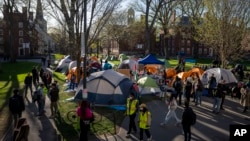
Protesters against the war between Israel and Hamas were voluntarily taking down their tents in Harvard Yard on Tuesday after university officials agreed to discuss their questions about the endowment, bringing a peaceful end to the kinds of demonstrations that were broken up by police on other campuses.
The student protest group Harvard Out of Occupied Palestine said in a statement that the encampment "outlasted its utility with respect to our demands." Meanwhile, Harvard University interim President Alan Garber agreed to pursue a meeting between protesters and university officials regarding the students' questions.
Students at many college campuses this spring set up similar encampments, calling for their schools to cut ties with Israel and businesses that support it.
The Israel-Hamas war began when Hamas and other militants stormed into southern Israel on October 7, killing some 1,200 people and taking 250 hostages. Palestinian militants still hold about 100 captives, and Israel's military has killed more than 35,000 people in Gaza, according to Gaza's Health Ministry, which doesn't distinguish between civilians and combatants.
Harvard said its president and the dean of the Faculty of Arts and Sciences, Hopi Hoekstra, will meet with the protesters to discuss the conflict in the Middle East.
The protesters said they worked out an agreement to meet with university officials, including the Harvard Management Company, which oversees the world's largest academic endowment, valued at about $50 billion.
The protesters' statement said the students will set an agenda that includes discussions on disclosure, divestment, reinvestment and the creation of a Center for Palestine Studies. The students also said that Harvard has offered to retract suspensions of more than 20 students and student workers and back down on disciplinary measures faced by 60 more.
"Since its establishment three weeks ago, the encampment has both broadened and deepened Palestine solidarity organizing on campus," a spokesperson for the protesters said. "It has moved the needle on disclosure and divestment at Harvard."





